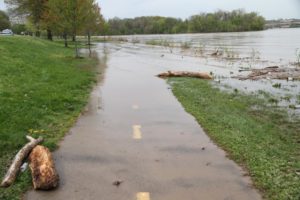This article was written by Audrey Batcheller
 So far this summer, Arlington has been subject to flash floods and flash flood warnings. While flash floods are obviously harmful to those who live in or are trying to navigate through a flooded area, the floods can actually be harmful to the ecology of the flooded waterway itself.
So far this summer, Arlington has been subject to flash floods and flash flood warnings. While flash floods are obviously harmful to those who live in or are trying to navigate through a flooded area, the floods can actually be harmful to the ecology of the flooded waterway itself.
A flash flood is a weather condition defined by the National Weather Service as “a rapid and extreme flow of high water into a normally dry area, or a rapid water level rise in a stream or creek above a predetermined flood level, beginning within six hours of the causative event.” In other words, a tremendous amount of water in a short amount of time caused by thunderstorms or heavy rainfall.
These types of storms are most common in Arlington during the spring and summer months due to the weather and climate of the area, which explains why the flood threats have picked up recently.
The effects of flash floods depend on factors such as the amount of previous rainfall the area has experienced and how much rainfall can be absorbed in the area. Flash floods, therefore, affect all areas and environments differently and there’s no blanket formula to predict how a storm will affect a given area.
 Aside from the potential danger presented from this type of extreme weather condition, heavy rainfall and flash floods can have negative impacts on our local streams and surrounding environments.
Aside from the potential danger presented from this type of extreme weather condition, heavy rainfall and flash floods can have negative impacts on our local streams and surrounding environments.
“When rainfall runs from developed surfaces in Arlington to local streams, it washes any nutrients on the surface into the watershed,” explains WJLA meteorologist and Arlington Public Schools high school science teacher Ryan Miller.
These nutrients can include fertilizer, pet waste, and gasoline, and when they infiltrate runoff heading towards local tributaries, they eventually end up in the Potomac River and ultimately the Chesapeake Bay. Waterways suffer from the introduction of these pollutants which catalyze a harmful process called eutrophication.
Eutrophication occurs when algae blooms in a body of water deplete the dissolved oxygen levels in the water. This loss of oxygen creates what is referred to as anoxic water and typically results in an environment unsuitable for living organisms.
The harmful effects of eutrophication and runoff can be augmented by flash flooding, considering the abundance of water washing into local streams such as Four Mile Run or Long Branch.
“You don’t typically see the effects in Arlington,” Miller said. “For example, you don’t see eutrophication in Four Mile Run, but you do in the Potomac River and the Chesapeake Bay.”
Although, the effects are not always observed locally, the health of local streams is crucial and plays a key role in the overall health of the watershed.
“We can try to reduce the effects, even though we can’t get rid of the storms,” said Miller.
Arlington County offers “Around the House Tips” for what Arlington residents can do to keep pollution out of Arlington’s streams. These tips include minimizing use of fertilizers and pesticides, picking up after pets, and washing cars on grass instead of pavement. Bigger projects like rain gardens are also great ways to reduce polluted runoff, and these adjustments can greatly reduce the number of pollutants getting washed into the watershed. Arlington residents are encouraged by the county’s Environmental Services department to consider taking these steps to protect our local waterways.
Want to know if you live in an area that might be prone to flooding? An update to the county’s Floodplain Map has been completed and will be effective starting August 19, 2013. This map helps promote public safety by identifying areas of Arlington with high flood risk.
File photo (top) courtesy Brendan L.

